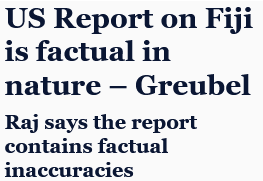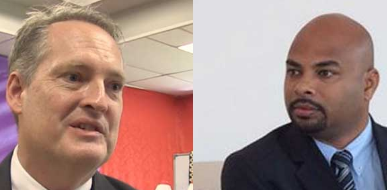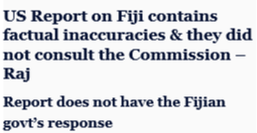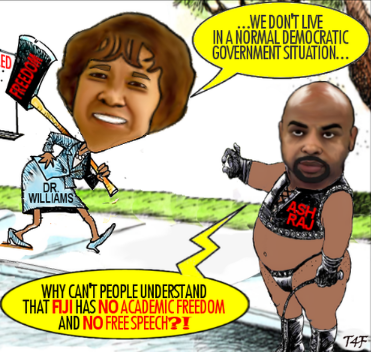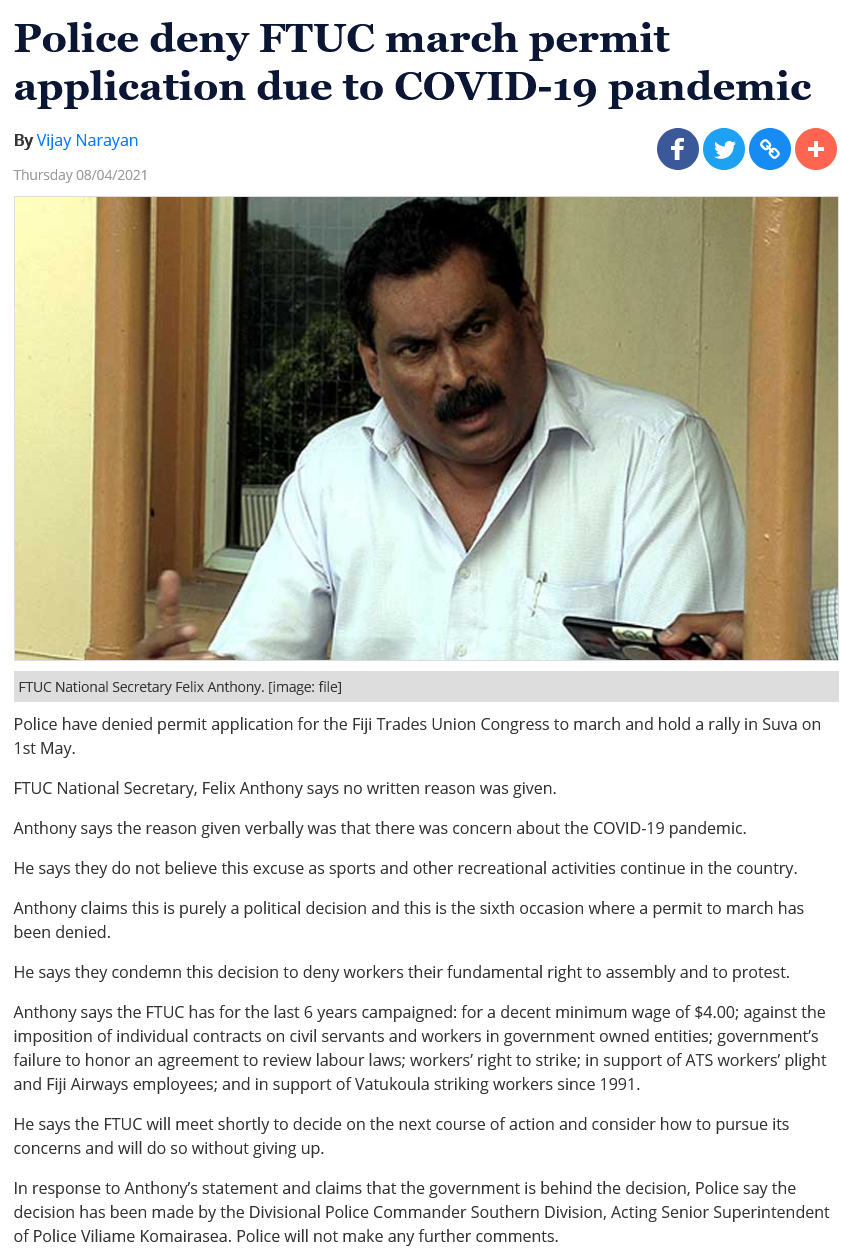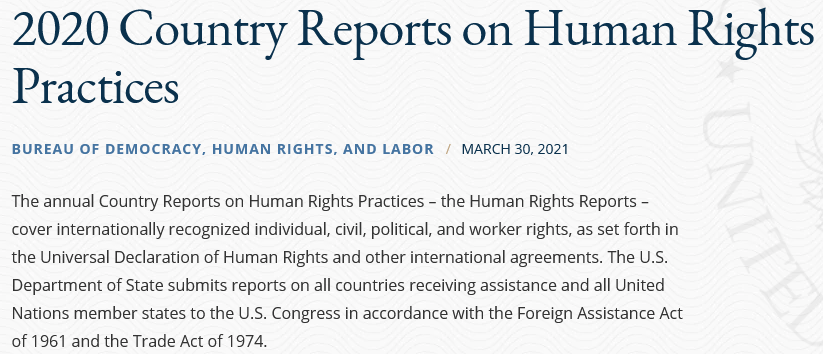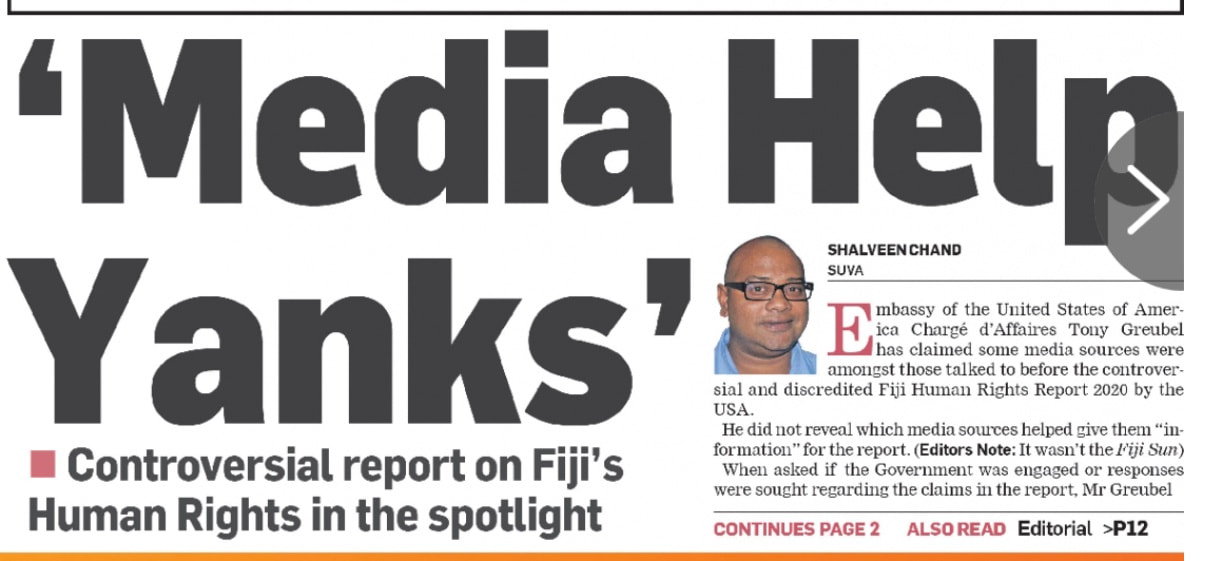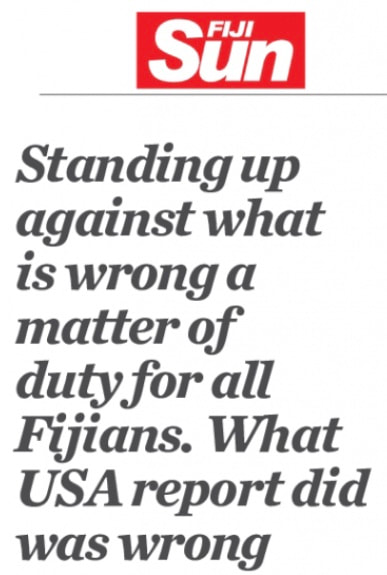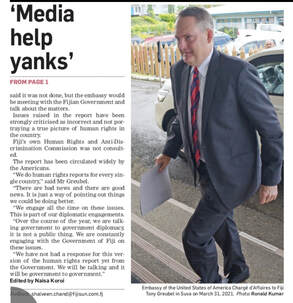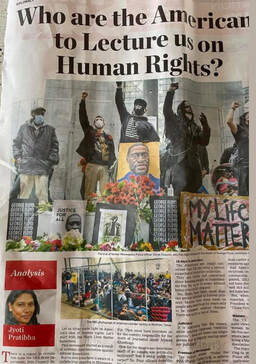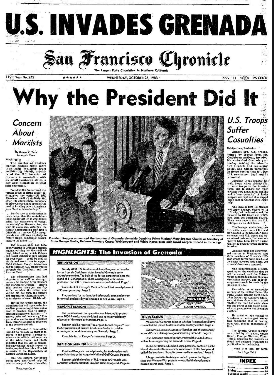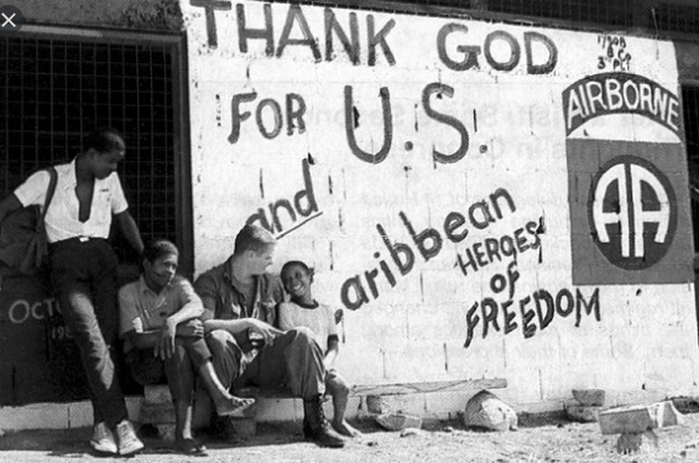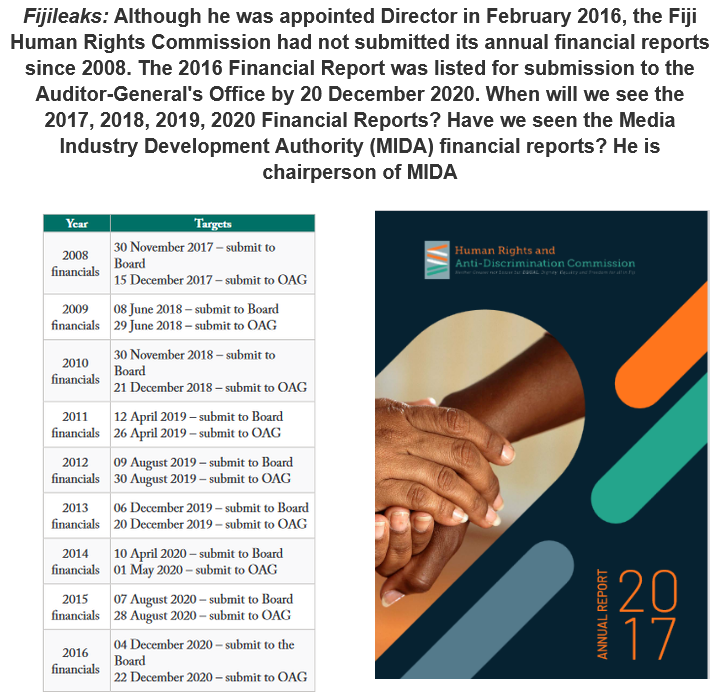Fijileaks: Although he was appointed Director in February 2016, the Fiji Human Rights Commission had not submitted its annual financial reports since 2008. The 2016 Financial Report was listed for submission to the Auditor-General's Office by 20 December 2020. ASHWIN RAJ, when will Fiji's taxpayers (who are paying a hefty undeserved salary to you) see
the 2017, 2018, 2019, 2020 FHRADC Financial Reports? INFORM US! Also, we are not interested in Bainimarama's Climate Change propaganda. We are interested in Change in Climate of Fear, Intimidation, Corruption and Dictatorship, as contained in the 2020 US FHR Report
"To increase respect for human rights by security forces, the Fiji Human Rights and Anti-Discrimination Commission (FHRADC), international organizations, and local nongovernmental organizations (NGOs) conducted a number of human rights training courses with law enforcers" -
FIJI 2020 Human Rights Report; Fijileaks: Factual Reporting!
DAVID versus GOLIATH DUEL with the UNITED STATES OF AMERICA
Gruebel should remind Raj of the October 1983 Invasion of Grenada
"Many governments that profess to respect human rights in principle may in fact secretly order or tacitly condone violations or abuses. Consequently, the reports look beyond statements of policy or intent to examine what a government actually did to protect human rights and promote accountability, including the extent to which it investigated, brought to trial, or punished those responsible for any violations or abuses." The US Secretary of State Antony J. Blinken
Since the inception of Country Human Rights Reports on Fiji, the US has never consulted the FHRC or whichever Government has been in power. The Fiji 2020 Human Rights Report is NO exception. Aside from gnomic RAJ, the Fiji Sun has gone barking mad, pointing out that neither any of its journalists were approached by the US Embassy in Suva. Understandably, for the Embassy must have concluded that these pro FFP journalists will be biased or even outright spies for FFP government. Throughout Fiji's post Independence history, all embassies and high commissions have fraternised with Fiji journalists to
"read" and 'report' back on Fiji. Our current Founding Editor-in-Chief was among the many journalists regularly consulted in the 1980s
Fiji 2020 Human Rights Report: Freedoms of Peaceful Assembly and Association
The constitution provides for the freedoms of peaceful assembly and association; however, the government restricted these freedoms in some cases.
Freedom of Peaceful AssemblyThe constitution provides for freedom of peaceful assembly but allows the government to limit this right in the interests of national security, public safety, public order, public morality, public health, and the orderly conduct of elections. The constitution also allows the government to limit freedom of assembly to protect the rights of others and imposes restrictions on public officials’ rights to freedom of assembly.
The POA allows authorities to use whatever force necessary to prohibit or disperse public and private meetings after “due warning,” in order to preserve public order.
Although event organizers said authorities were sometimes very slow to issue permits, they granted permits for public rallies in support of the lesbian, gay, bisexual, transgender, and intersex (LGBTI) community and the 16 Days of Activism against Domestic Violence Campaign. Authorities, however, denied permits for public-service unions and the political opposition to protest.
Executive members of the Fijian Teachers Association (FTA), an affiliate member of FTUC, claimed police harassed and threatened them with “further action” over plans to hold a march during an Asian Development Bank (ADB) summit to be hosted by Fiji from May 1-5, and also if they failed to turn up for meetings at the police office. The Ministry of Education also threatened teachers with further reprisals, including legal action, if they participated in a planned May 3 nationwide strike (see section 7, below).
On June 17, police detained the president of the Fiji National Farmers Union (NFU), Surendra Lal, for questioning regarding alleged incitement and threatening to disrupt the harvesting of sugar cane. After two days Lal was released without being charged. According to an NFU statement, the detention came when growers were protesting low cane payments, a low forecast price for sugar, and the imposition of cane-cartage weight restrictions for trucks, which the union claimed would significantly add to transport costs.
The constitution provides for the freedoms of peaceful assembly and association; however, the government restricted these freedoms in some cases.
Freedom of Peaceful AssemblyThe constitution provides for freedom of peaceful assembly but allows the government to limit this right in the interests of national security, public safety, public order, public morality, public health, and the orderly conduct of elections. The constitution also allows the government to limit freedom of assembly to protect the rights of others and imposes restrictions on public officials’ rights to freedom of assembly.
The POA allows authorities to use whatever force necessary to prohibit or disperse public and private meetings after “due warning,” in order to preserve public order.
Although event organizers said authorities were sometimes very slow to issue permits, they granted permits for public rallies in support of the lesbian, gay, bisexual, transgender, and intersex (LGBTI) community and the 16 Days of Activism against Domestic Violence Campaign. Authorities, however, denied permits for public-service unions and the political opposition to protest.
Executive members of the Fijian Teachers Association (FTA), an affiliate member of FTUC, claimed police harassed and threatened them with “further action” over plans to hold a march during an Asian Development Bank (ADB) summit to be hosted by Fiji from May 1-5, and also if they failed to turn up for meetings at the police office. The Ministry of Education also threatened teachers with further reprisals, including legal action, if they participated in a planned May 3 nationwide strike (see section 7, below).
On June 17, police detained the president of the Fiji National Farmers Union (NFU), Surendra Lal, for questioning regarding alleged incitement and threatening to disrupt the harvesting of sugar cane. After two days Lal was released without being charged. According to an NFU statement, the detention came when growers were protesting low cane payments, a low forecast price for sugar, and the imposition of cane-cartage weight restrictions for trucks, which the union claimed would significantly add to transport costs.
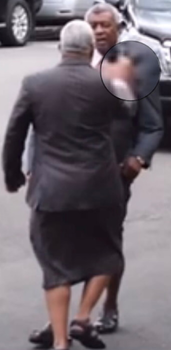
On October 8, police rejected a request from the opposition National Federation Party (NFP) for a permit to march in Suva on October 10, Fiji’s national day. The police claimed the party failed to fulfill filing requirements. The proposed march was to protest the delayed police investigation into an alleged assault on NFP President Pio Tikoduadua by Prime Minister Bainimarama on August 9 (see section 3, below).
Freedom of Association
The constitution provides for freedom of association but limits this right in the interests of national security, public order, and morality and also for the orderly conduct of elections. The government generally did not restrict membership in NGOs, professional associations, and other private organizations.
On May 2, police raided the FTUC’s headquarters without a warrant and confiscated documents, laptops, and other equipment belonging to the union.
Fijileaks: The 2021 Report next March will highlight the following - denial of march permit application to the FTUC
Freedom of Association
The constitution provides for freedom of association but limits this right in the interests of national security, public order, and morality and also for the orderly conduct of elections. The government generally did not restrict membership in NGOs, professional associations, and other private organizations.
On May 2, police raided the FTUC’s headquarters without a warrant and confiscated documents, laptops, and other equipment belonging to the union.
Fijileaks: The 2021 Report next March will highlight the following - denial of march permit application to the FTUC
Fijileaks to ASHWIN RAJ: Before issuing "Gnomic" Response, go take a lesson from the United States on How to File Fiji Human Rights Report. Better still, provide us with an uptodate account of FHRC Annual Reports
PREFACE:
I am honored to release the 45th annual Country Reports on Human Rights Practices and to reaffirm the United States’ commitment to placing human rights at the center of our foreign policy. The cause of human rights, freedom, and dignity is close to the American heart. As President Biden emphasized, “We must start with diplomacy rooted in America’s most cherished democratic values: defending freedom, championing opportunity, upholding universal rights, respecting the rule of law, and treating every person with dignity.” Transparency and accountability are integral to this process. By documenting the status of human rights around the world each year, the U.S. Department of State provides objective and comprehensive information to Congress, civil society, academics, activists, and people everywhere – all of whom have roles to play in promoting human rights and accountability for rights abuses and violations.
The 2020 report reflects the unique challenges that nations had to confront as the COVID-19 virus spread throughout the world. The pandemic impacted not only individuals’ health, but their abilities to safely enjoy their human rights and fundamental freedoms. Some governments used the crisis as a pretext to restrict rights and consolidate authoritarian rule. Other governments relied on democratic values and processes, including a free press, transparency, and accountability, to inform and protect their citizens. Women and children faced heightened risk as the prevalence of gender-based and domestic violence increased due to lockdowns and the loss of traditional social protections. Other marginalized populations, including older persons, persons with disabilities, and LGBTQI+ persons, experienced particular vulnerability.
Human rights are interdependent, and the deprivation of one right can cause the broader fabric of a society to fray. Despite potential risks to their health or threats of arrest or other repercussions, people around the world demanded that governments respect their human rights and inherent dignity. From Hong Kong to Belarus, from Nigeria to Venezuela, people assembled in the streets. (Fijileaks: Except in Fiji where application to march peacefully have been consistently refused). They called for governmental protection of their human rights and fundamental freedoms, safeguards for free and fair elections, and an end to discrimination.
Too many people continued to suffer under brutal conditions in 2020. In China, government authorities committed genocide against Uyghurs, who are predominantly Muslim, and crimes against humanity including imprisonment, torture, enforced sterilization, and persecution against Uyghurs and members of other religious and ethnic minority groups. Assad’s atrocities against the people of Syria continued unabated, and this year marks ten years of their struggles to live in dignity and freedom. The war in Yemen has driven millions to extreme humanitarian need, preventing them from exercising many of their basic rights. The Russian government has targeted political dissidents and peaceful protestors, while official corruption remained rampant. The corruption of Nicolas Maduro increased the dire humanitarian crisis of the Venezuelan people.
In Nicaragua, the corrupt Ortega regime passed increasingly repressive laws that limit severely the ability of opposition political groups, civil society, and independent media to operate. Meanwhile in Cuba, government restrictions continued to suppress the freedoms of expression, association, religion or belief, and movement. State-sanctioned violence in Zimbabwe against civil society activists, labor leaders, and opposition members continued a culture of impunity, and LGBTQI+ persons continued to be vulnerable to violence, discrimination, and harassment due to criminalization and stigma associated with same-sex sexual conduct. In Turkmenistan, citizens criticizing the government faced possible arrest for treason, and the whereabouts of more than 100 political prisoners remain unknown.
These and other ongoing rights abuses cause untold damage well beyond the borders of any single country; unchecked human rights abuses anywhere can contribute to a sense of impunity everywhere. That is precisely why this Administration has placed human rights front and center in its foreign policy. Recognizing that there is work to be done at home, we are also striving to live up to our highest ideals and principles and are committed to working toward a fairer and more just society in the United States. We all have work to do, and we must use every tool available to foster a more peaceful and just world.
Antony J. Blinken
Secretary of State
I am honored to release the 45th annual Country Reports on Human Rights Practices and to reaffirm the United States’ commitment to placing human rights at the center of our foreign policy. The cause of human rights, freedom, and dignity is close to the American heart. As President Biden emphasized, “We must start with diplomacy rooted in America’s most cherished democratic values: defending freedom, championing opportunity, upholding universal rights, respecting the rule of law, and treating every person with dignity.” Transparency and accountability are integral to this process. By documenting the status of human rights around the world each year, the U.S. Department of State provides objective and comprehensive information to Congress, civil society, academics, activists, and people everywhere – all of whom have roles to play in promoting human rights and accountability for rights abuses and violations.
The 2020 report reflects the unique challenges that nations had to confront as the COVID-19 virus spread throughout the world. The pandemic impacted not only individuals’ health, but their abilities to safely enjoy their human rights and fundamental freedoms. Some governments used the crisis as a pretext to restrict rights and consolidate authoritarian rule. Other governments relied on democratic values and processes, including a free press, transparency, and accountability, to inform and protect their citizens. Women and children faced heightened risk as the prevalence of gender-based and domestic violence increased due to lockdowns and the loss of traditional social protections. Other marginalized populations, including older persons, persons with disabilities, and LGBTQI+ persons, experienced particular vulnerability.
Human rights are interdependent, and the deprivation of one right can cause the broader fabric of a society to fray. Despite potential risks to their health or threats of arrest or other repercussions, people around the world demanded that governments respect their human rights and inherent dignity. From Hong Kong to Belarus, from Nigeria to Venezuela, people assembled in the streets. (Fijileaks: Except in Fiji where application to march peacefully have been consistently refused). They called for governmental protection of their human rights and fundamental freedoms, safeguards for free and fair elections, and an end to discrimination.
Too many people continued to suffer under brutal conditions in 2020. In China, government authorities committed genocide against Uyghurs, who are predominantly Muslim, and crimes against humanity including imprisonment, torture, enforced sterilization, and persecution against Uyghurs and members of other religious and ethnic minority groups. Assad’s atrocities against the people of Syria continued unabated, and this year marks ten years of their struggles to live in dignity and freedom. The war in Yemen has driven millions to extreme humanitarian need, preventing them from exercising many of their basic rights. The Russian government has targeted political dissidents and peaceful protestors, while official corruption remained rampant. The corruption of Nicolas Maduro increased the dire humanitarian crisis of the Venezuelan people.
In Nicaragua, the corrupt Ortega regime passed increasingly repressive laws that limit severely the ability of opposition political groups, civil society, and independent media to operate. Meanwhile in Cuba, government restrictions continued to suppress the freedoms of expression, association, religion or belief, and movement. State-sanctioned violence in Zimbabwe against civil society activists, labor leaders, and opposition members continued a culture of impunity, and LGBTQI+ persons continued to be vulnerable to violence, discrimination, and harassment due to criminalization and stigma associated with same-sex sexual conduct. In Turkmenistan, citizens criticizing the government faced possible arrest for treason, and the whereabouts of more than 100 political prisoners remain unknown.
These and other ongoing rights abuses cause untold damage well beyond the borders of any single country; unchecked human rights abuses anywhere can contribute to a sense of impunity everywhere. That is precisely why this Administration has placed human rights front and center in its foreign policy. Recognizing that there is work to be done at home, we are also striving to live up to our highest ideals and principles and are committed to working toward a fairer and more just society in the United States. We all have work to do, and we must use every tool available to foster a more peaceful and just world.
Antony J. Blinken
Secretary of State
Country Report Preparation
This report is submitted to the Congress by the Department of State pursuant to Sections 116(d) and 502B(b) of the Foreign Assistance Act of 1961. 19 U.S.C. § 2464, 2467 also require that U.S. foreign and trade policy take into account countries’ human rights and worker rights performance and that country reports be submitted to the Congress on an annual basis.
This report includes documents on several countries that do not fall into the categories established by these statutes and thus are not covered by the congressional requirement.
The report addresses situations and events in calendar year 2020 only.
The Department of State prepared this report using information from U.S. embassies and consulates abroad, foreign government officials, nongovernmental and international organizations, jurists and legal experts, journalists, academics, labor activists, and published reports. U.S. diplomatic missions abroad prepared the initial drafts of the individual country reports.
Once the initial drafts of the individual country reports were completed by U.S. missions abroad, the Bureau of Democracy, Human Rights, and Labor (DRL), in cooperation with other Department of State offices with the relevant country and regional expertise, reviewed and edited the reports, drawing on its own sources of information as well as of the Department of Labor. Bureau officers also consulted experts in the Department of State and elsewhere on worker rights, refugee issues, police and security issues, women’s issues, and legal matters, among many others. The guiding principles were that all information be reported objectively, thoroughly, and fairly. DRL, working with other Department offices as necessary, also ensured that all reports followed the same methodology and conformed to standard format and structure.
This report is submitted to the Congress by the Department of State pursuant to Sections 116(d) and 502B(b) of the Foreign Assistance Act of 1961. 19 U.S.C. § 2464, 2467 also require that U.S. foreign and trade policy take into account countries’ human rights and worker rights performance and that country reports be submitted to the Congress on an annual basis.
This report includes documents on several countries that do not fall into the categories established by these statutes and thus are not covered by the congressional requirement.
The report addresses situations and events in calendar year 2020 only.
The Department of State prepared this report using information from U.S. embassies and consulates abroad, foreign government officials, nongovernmental and international organizations, jurists and legal experts, journalists, academics, labor activists, and published reports. U.S. diplomatic missions abroad prepared the initial drafts of the individual country reports.
Once the initial drafts of the individual country reports were completed by U.S. missions abroad, the Bureau of Democracy, Human Rights, and Labor (DRL), in cooperation with other Department of State offices with the relevant country and regional expertise, reviewed and edited the reports, drawing on its own sources of information as well as of the Department of Labor. Bureau officers also consulted experts in the Department of State and elsewhere on worker rights, refugee issues, police and security issues, women’s issues, and legal matters, among many others. The guiding principles were that all information be reported objectively, thoroughly, and fairly. DRL, working with other Department offices as necessary, also ensured that all reports followed the same methodology and conformed to standard format and structure.
